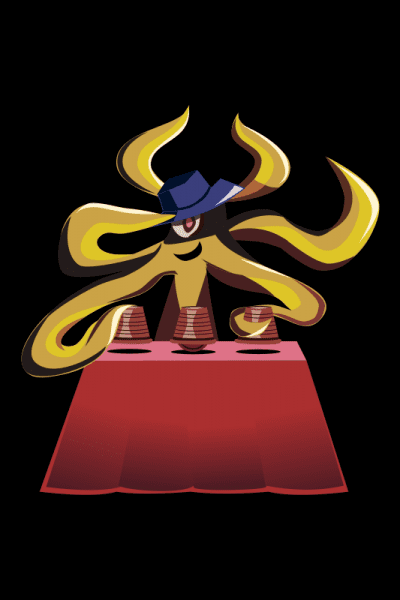Trickster
Alert

Control
Meta
Type
Power of Tomfoolery
Turns Encounter into a Game
As a leader, after arrival, you may use this power to transform the encounter into a “card game”. A card game is a clash by default. This encounter, aliens may prime any pod in their cache as their driver. The outcome of a card game is entirely determined by the leaders’ drivers. The driver with the higher might wins. This encounter, non-attack pods have a might of 50 against attack pods 10 or higher and a might of -10 against attack pods 09 or less. Non-attack pods tie against non-attack pods. Winning with a non-attack pod results in a peaceful victory. If you tie, the card game becomes a negotiation.
Legacy: If a hazard is in effect, the encounter becomes a card game.
No one knows frivolity quite like the Tricksters. They have the uncanny ability to turn anything into a game, even something as serious and intense as an encounter. Who could ever imagine that war could be reduced to a simple card game?
Leader: Arrival
Optional
Wild Flare
As an actor, after contact, you may discharge this flare to extract a pod from the forge. If the extracted pod is an encounter pod, add 10 to your fleet’s might. Otherwise, subtract 10 from your fleet’s might.
Actor: Contact
Super Flare
As a leader, after losing an encounter that did not involve a card game, you may discharge this flare to use your power. The result of the card game from this aspect determines the outcome of the encounter.
Leader: Encounter
Modifications
- Original power name is the power of “possibilities.” To me, this name doesn’t relate enough to tricking people, and the power to “trick” is too on the nose.
- Trickster’s original power has the leader put a coin behind their back and makes the other leader guess which hand the coin is in. It essentially turns the encounter into a coin flip, allowing no room for strategy or manipulation. I came up with the card game system to make it a more contemplative gamble.
- Original Trickster’s power has no means to win peacefully or negotiate when using its power. I added these elements to increase the mind games.
- Original Wild Trickster uses a coin flip instead of extracting a pod. Calling the coin flip right adds, while calling it wrong subtracts.
- Original Super Trickster naturally doesn’t play card games. Instead, it uses its normal power of choosing which hand has the coin in the event of loss.
- Trickster’s legacy turns about 1/3 of encounters into card games, making sponsors useless during these encounters. Leaders will know in advance, so they will almost certainly not invite sponsors. It negatively harms aliens like Cavalry and Sapient that try to gain alliances by helping with combat. However, more off-the-wall support aliens like Parasite and Observer can still get some use from it, as well as aliens like Mind, Vox, and Oracle who can dominate card games.
Tips
- Trickster always has a fighting chance in an encounter due to its power, making ship count, encounter pod strength, and combat powers meaningless.
- Strong attack pods (10 or higher) are the safest pods to play in a card game. They can only lose to stronger attack pods and non-attack pods. If they lose to the latter, the win will be peaceful, meaning no ships or bases will be lost.
- Flares are generally a bad idea to play in a card game, as they will get scrapped after use. However, this can be useful to get rid of a burnout pod without giving it to its owner.
- Gaining compensation against Trickster is ill-advised, as you don’t want it to know what pods are in your cache.
- If Trickster is going to play a card game, it has no reason to commission sponsors. If the opponent invites them and a card game occurs, they will be handing out free rewards for no benefit. Trickster can take advantage of this fact to trick its opponent into commissioning no one and having no sponsors during combat.
Development Notes
- One major aspect that harms the original Trickster power is how it turns every encounter into a game of pure chance. While normal encounters have a component of luck behind them, Cosmic has always been designed such that the best players still tend to win more games on average.
- I went with the power to “fool around” over the power to “fool” or “deceive” since it is more in line with turning the encounter into a game.
- I’ve considered whether my expanded version of Trickster is still green alert due to the additional complications. It strikes me as a sort of wordy power that’s easy to understand once you start using it. To me, the threshold for green alert is whether it would be okay for a first-time Cosmic player to use the power. They don’t have to know anything about what the pods mean or the deeper strategy of the game, since everything is simplified to numbers and lack of numbers (though it does bring to mind the confusion caused by reinforcement pods that I still want to address.)
- The card game is designed to encourage mind games with the opponent. Non-attack pods are the most common type of card between negotiates and support pods. However, using a support pod during a card game means you won’t get the effect of the pod, and you’ll also win peacefully. It means aliens will be more hesitant to use these pods, making them upsets. The optimal pods to use are strong encounter pods, but if both leaders do this then the weaker pod will lose, as a more simplified version of the encounter. If the alien knows what the opponent is holding, they will have a better idea what to play, meaning my Trickster has a worse matchup against Mind when challenging it to a card game.
- I wanted to keep Trickster’s power as interesting as possible since it nullifies many raw combat powers like Virus and Warrior. I wanted aliens like Sorcerer, Oracle, and Volt to still have the ability to factor in their powers during the card game, so the card game itself still needs to follow the standard invasion protocol. Oracle causes a real problem against Trickster, since it can always see what Trickster will play. The only situation where Oracle could lose against Trickster would be when it physically lacks a card that could win. However, Trickster’s power being optional prevents it from being in an unwinnable situation, and it still grants Oracle the option to negotiate even if it does decide to play the card game.
- The peaceful victory clause is an interesting one, as it offers Trickster a form of ship protection that affects both fleets. Having a situational peaceful effect greatly affects the mind games of the power, while also providing more options to both leaders. If an alien only has pods that are 10 or higher, a non-attack pod would be a guaranteed victory. However, it would be a peaceful victory, whereas beating a strong attack pod with a stronger attack pod will win normally. This also means the 40 pod is the safest pod to play in a card game, as the worst that can happen is a peaceful loss to an N (though this will scrap the 40, so it is not a free action). It is a rare circumstance where the 40 pod may be worth playing outside of a regular encounter.
- I wanted to make sure that Trickster carries a different overall theme compared to the later released Swindler, which I renamed to Scammer. Scammer is an out-and-out cheat, trying to rob other aliens of their resources. Trickster is more like Bugs Bunny, making a game out of serious combat and getting onto the planet before anyone realizes what happened.
- The only benefit original Trickster gets from its power is the ability to decide when to use the power, since the coin game puts both sides on an even playing field. The card game can definitely give one side an advantage, especially when one side knows what the other is holding. I appreciate the interaction with aliens like Mind, Calculator, Glitch, Gambler,
- The main difference I see between the Trickster and the Swindler thematically is that while both will challenge you to a shell game, the Trickster will rely on its skill while the Scammer will cheat. Mechanically, Scammer doesn’t get any advantage in the card game, but it can cheat you out of your ships if you beat it.
- Interestingly, due to my phrasing, Villain can add non-attack pods to its superweapon, but they will have no numerical value while part of it since Trickster’s bonus only applies during card games, where Villain’s superweapon is ineffective.
